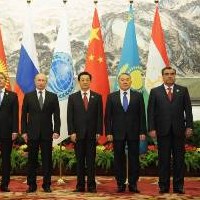Published: may 14, 2010; Are Repressive Dictatorships Merely A Matter of Taste, of Different Strokes for Different Folks?
By Barry Rubin,
The elections to the UN Human Rights Council brought onto that body such human rights’ violators as Libya, Angola, Malaysia, and Uganda. Indeed, 80 percent of UN members—many motivated by being Muslim-majority or African states—thought the Qadhafi dictatorship an excellent addition to the group that already includes Saudi Arabia, China, and Cuba.
My expectations of the UN are very low indeed. So what interested me here is what the Obama Administration’s refusal to contest the issue says about its foreign policy concept.
After the vote electing Libya and the others, U.S. Ambassador to the UN Susan Rice would only say that her government regretted the victory of several countries but added,
“I am not going to name names. I don’t think it’s particularly constructive at this point.”
Rice went on to say that the human-rights’ smashing dictatorships on the Council were just
“countries whose orientation and perspectives we don’t agree with.”
These two quotes are very revealing. The Obama Administration understandably believes that its predecessor made a lot of enemies by criticizing radical regimes and hostile countries. Thus, the current government is determined not to complain about anyone except under the most extreme pressure—witness the president’s reluctance to say anything about Iran’s stolen election—or unless the target is a friendly country—like Honduras or Israel–that isn’t going to do anything nasty to America.
Or to put it another way, the Bush Administration went to far in saying: You are either with us or against us. Unfortunately, the Obama Administration has gone too far in the other direction in saying: You’re against us? Who can blame you?
And while Bush’s policy certainly made enemies, Obama’s policy strengthens enemies.
In trying not to be a bully, the current approach goes too far and makes America the victim whom bullies kick around. That’s even more true for those who are America’s friends and the bullies’ intended victims.
One aspect of this dangerous course is that the “live and let live” approach of U.S. policy lets the radicals make gains without having to give up anything in return. The other side doesn’t believe in watching passively those with whom they disagree but rather seek to intimidate and defeat them.
This mismatch of policies will go on until the U.S. government decides it has had enough. It would be best if the current leaders made that decision. Unfortunately, that might require a different government, which means the United States will take a lot more hits before the situation is turned around.
Having determined that conflict is not “constructive,” the Obama Administration wants to avoid it. This requires downplaying or covering up things that enemies do, for example: Iran working with al-Qaida, killing Americans in Iraq, and arming anti-American forces in Afghanistan; Syria taking over Lebanon and sponsoring the terrorists killing Americans in Iraq. Many more items could be added to this list.
As for that second statement of Rice, I think the phrase, “countries whose orientation and perspectives we don’t agree with,” may go down in history. It sounds as if America can just agree to disagree with such regimes as each goes its separate ways. May the best man win.
One can imagine it in the mouth of some 1930s’ French or British statesman advocating appeasement. It also reminds me of what the Soviet foreign minister [Vyacheslav Molotov] said, after the Soviet-German alliance of 1939, that fascism was a matter of taste.
Indeed, this approach also matches up with two phrases from Obama himself. First, the president said:
“We must be as persistent and passionate in our pursuit of progress as any who would stand in our way.”
That formulation implies that those “who would stand in our way” are equally persistent and passionate in pursuing progress but they just have a different orientation and perspective on how to do so.
It is a very relativistic, Politically Correct, multi-cultural worldview: We believe we’re right (though we’ve been wrong a lot in the past, sorry about that!); they believe they’re right. Who’s to say?
Well, not America. For as Obama told the nuclear summit:
“It is a vital national security interest of the United States to reduce these conflicts because whether we like it or not, we remain a dominant military superpower, and when conflicts break out, one way or another we get pulled into them.”
To avoid war one must avoid conflict, which also helps to avoid the United States having to act as a superpower. The preferred posture is, apparently, to be as much as possible a bystander, unless there is some idealistic goal like eliminating all nuclear weapons or saving the earth from human-triggered global warming.
Once you decide that avoiding friction is the most important thing you MUST be nicer to enemies because they are the ones who would otherwise create conflict. That’s why this administration is being nicer to Pakistan than to India, to Venezuela than to Colombia, to the Palestinian Authority than to Israel, to Syria than to Lebanon, to Russia than to Poland.
Another paradox of this approach is this: How can you say that you have sympathy for the poor and downtrodden, the masses of ordinary people, in the world when you are indifferent about the main factor oppressing them? And in 2010 that isn’t Western imperialism but their own corrupt and dictatorial rulers.
That doesn’t mean you have to make democracy promotion the main policy priority or that you can’t deal with dictatorships who are providing something you need in terms of national interest. But why have any respect for repressive governments which don’t do so? This is why Obama’s policy is reactionary, not liberal, why he refused to condemn Iran’s stolen election or say kind words about the courageous opposition until he was practically forced to mutter something.
This whole approach has very little in common with the liberal Democratic party views of such people as Franklin Delano Roosevelt, Harry S. Truman, John F. Kennedy, Lyndon Johnson, Hubert Humphrey, and even Bill Clinton. These leaders were internationalists who believed in American leadership and that somehow moderates and democrats were superior and preferable, even though the World War and the Cold War sometimes required unsavory allies. One can hardly imagine them shrugging off aggressive anti-American repressive regimes as merely “countries whose orientation and perspectives we don’t agree with.”
The problem isn’t just that the United States doesn’t agree with how these countries behave. The problem is that those regimes’ behavior is directed toward defeating and destroying U.S. interests and influence, enslaving their own and neighboring peoples. Or, to put it another way, this isn’t some philosophical disagreement but a historic battle that will dominate our era and determine the future of the world.
About the author,
Barry Rubin is director of the Global Research in International Affairs (GLORIA) Center and editor of the Middle East Review of International Affairs (MERIA) Journal. His latest books are The Israel-Arab Reader (seventh edition), The Long War for Freedom: The Arab Struggle for Democracy in the Middle East (Wiley), and The Truth About Syria (Palgrave-Macmillan). His new edited books include Lebanon: Liberation, Conflict and Crisis; Guide to Islamist Movements; Conflict and Insurgency in the Middle East; The West and the Middle East (four volumes); and The Muslim Brotherhood: The Organization and Policies of a Global Islamist Movement.
To read and subscribe to MERIA, GLORIA articles, or to order books, go Here. To see or subscribe to his blog, Rubin Reports, go Here.



 RSS
RSS











"A Matter Of Taste" Dictatorships in the Human Rights Council. About the hypocrisy of the UN, US and the World. http://j.mp/cbPpZk
RT @CrethiPlethi: "A Matter Of Taste" Dictatorships in the Human Rights Council. About the hypocrisy of the UN, US and the World. http://j.mp/cbPpZk
[…] This post was mentioned on Twitter by Elisabeth, Crethi Plethi. Crethi Plethi said: "A Matter Of Taste" Dictatorships in the Human Rights Council. About the hypocrisy of the UN, US and the World. http://j.mp/cbPpZk […]